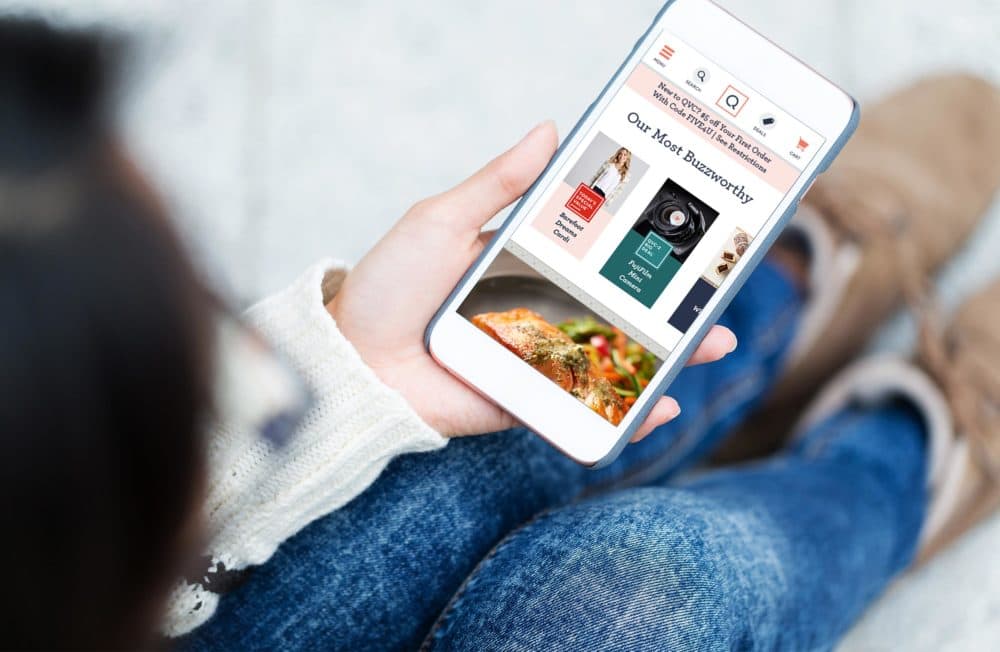Advertisement
View From The Top
As Retails Stores Stay Shuttered, Quarantined Americans Turn TVs To QVC And HSN
Resume
While retail sales have dropped significantly since the start of the coronavirus pandemic, viewership has increased for QVC and HSN.
When shelter-in-place orders first started in mid-March, QVC and HSN saw a halt in consumer spending, says Mike George, president and CEO of Qurate Retail, the parent company for the networks. But once the initial shock of the orders wore off, viewership and website visits rebounded.
“We really saw that start to take off in late March and the sales followed,” he says. “So we've been pleased with the customer response over the last several weeks.”
The networks hope to serve as “an antidote to the depressing news cycle” — a place of respite and entertainment, George says. That’s part of the reason more people are tuning in: As QVC founder Joseph Segel once said, "There's no bad news on QVC.”
Plus, consumers are at home spending more time watching TV and browsing the web, he says.
Whether customers wanted to purchase anything or not, George says his team wants to support and inspire them. Between 85% to 90% of sales come from women, he says.
To adapt to customers’ needs during a crisis, the channels are tailoring sales pitches to fit the moment. George says he’s seen a more “fundamental shift” in customers’ buying habits in recent months than ever before.
Sales for clothing, accessories and jewelry are down, he says — while cooking, decor, outdoor, health and fitness products have grown.
Worldwide, hosts and small crews are still coming into the company’s live studios to film with the products. Guests Skype in from home, which taught George that viewers like the intimacy of seeing guests’ homes and kitchens.
Shipping is taking longer than usual during the crisis and the networks have been transparent about the delays, he says. The company had to rethink its fulfillment centers and enact strict rules around social distancing.
“It meant eliminating all the normal productivity standards because we wanted the message to be clear: We want you to be safe, not fast,” he says.
The company gave fulfillment center workers the option to stay home, leave or come in late if they felt uncomfortable, and offered partial pay to stay home, he says.
Before the pandemic, sales on QVC and HSN had been “a little softer” as the networks adjust to fewer people paying to watch TV, he says. The company is trying to bring its brand to life online by live streaming on Facebook, YouTube and its own digital apps to replace the declining TV viewership, he says.
Retail has taken a big hit in this crisis: Major retailers such as J. Crew and J.C. Penney have declared bankruptcy, while small businesses are worried they may never reopen.
George also serves as chairman of the National Retail Federation, which has advocated for support for the retail community and shared practices on how to reopen retail safely during the pandemic.
Now, the association is looking at how to innovate and return to growth, he says. Though the pandemic has been tough on retail, it also forced innovation to accelerate.
“In this kind of environment where you've got to make bigger, bolder changes faster, I'm excited about the pace of innovation,” he says. “I think we're seeing three years worth of innovation in three months.”
Despite that the economic fallout will cause financial loss and some retailers to close for good, George believes the industry can adapt by focusing on digital innovation.
The CARES Act has helped retailers, but he says the money needs to be spent effectively. More programs could help support small and mid-size businesses facing liquidity challenges, he says.
While the stimulus checks helped retailers by putting money back into the economy, he says the government needs to continue watching how consumers respond. But it’s too soon to tell whether more aid is necessary, he says.
The association is concerned about how store closures will impact small business, he says. The number of small businesses that close will depend on how quickly consumers rebound, he says.
As part of a COVID-19 relief package, the networks partnered with NRF to donate airtime to promote 20 small retailers around the country. Beyond promoting this handful of businesses, the goal of the partnership was to motivate consumers to support small retailers in their communities, he says.
“The large retailers will do fine. They'll get through this with some pain, but go out and support that small retailer,” he says. “I think that's the best way we can all ensure that Main Street is still crowded and busy going forward, if we just support our small business community.”
Julia Corcoran produced and edited this interview for broadcast with Tinku Ray. Allison Hagan adapted it for the web.
This segment aired on May 26, 2020.

